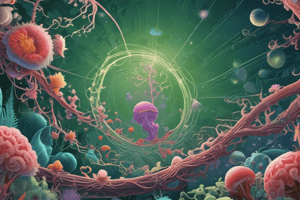Podcast
Questions and Answers
O que são células na biologia?
O que são células na biologia?
As células são a menor unidade fundamental de estrutura e função em organismos vivos.
Explique o que são macromoléculas na biologia.
Explique o que são macromoléculas na biologia.
Macromoléculas são grandes moléculas compostas por moléculas menores, como proteínas e ácidos nucleicos.
O que são organelas no contexto da biologia?
O que são organelas no contexto da biologia?
As organelas são compartimentos envolvidos por membranas dentro de uma célula, como o núcleo e as mitocôndrias.
Como os organismos são definidos na biologia?
Como os organismos são definidos na biologia?
O que são tecidos na biologia?
O que são tecidos na biologia?
O que são órgãos na biologia?
O que são órgãos na biologia?
Qual é a definição de ecossistema?
Qual é a definição de ecossistema?
O que estuda a microbiologia?
O que estuda a microbiologia?
Por que a ecologia é importante na biologia?
Por que a ecologia é importante na biologia?
Qual é a aplicação da biologia na agricultura?
Qual é a aplicação da biologia na agricultura?
Flashcards are hidden until you start studying
Study Notes
Science: The Study of Life and the Living World
Science is a broad field of inquiry that spans from the study of the smallest subatomic particles to the vastness of the universe. One of its major branches is biology, the study of living organisms and their interactions with each other and their environments. This article provides an overview of biology, its subdisciplines, and its importance in various fields.
The Science of Life
Biology is a fundamental branch of science that encompasses the study of life and how it survives and changes. The study of biology is inherently interconnected with the study of living organisms and their interactions with each other and their environments. Some of the key concepts in biology include:
- Cells: The smallest fundamental unit of structure and function in living things.
- Macromolecules: Large molecules made up of smaller molecules, such as proteins and nucleic acids.
- Organelles: Membrane-bound compartments within a cell, such as the nucleus and mitochondria.
- Organisms: Individual living entities that can range from the simplest prokaryotes (single-celled organisms without a nucleus) to the most complex eukaryotes (multi-cellular organisms with a nucleus and other membrane-bound organelles).
- Tissues: Groups of similar cells that perform the same function, such as muscle tissue and nerve tissue.
- Organs: Structures formed of tissues that operate together to perform a common function, such as the heart and the lungs.
- Organ systems: Higher levels of organization that consist of functionally related organs, such as the circulatory system and the nervous system.
- Populations: All individuals within a species living within a specific area.
- Communities: Sets of populations inhabiting a particular area.
- Ecosystems: All living things in a particular area together with the abiotic, nonliving parts of that environment.
- Biosphere: A collection of all ecosystems on Earth.
- Evolution: The process of gradual change in a population that can also lead to new species arising from older species.
The Diversity of Biology
Biology is a vast discipline that covers a wide range of subdisciplines, each focusing on different aspects of living organisms and their interactions with their environments. Some of the key subdisciplines of biology include:
- Molecular biology: The study of the molecular basis of biological activity, including the structure and function of macromolecules and the processes of gene expression and protein synthesis.
- Microbiology: The study of microorganisms, such as bacteria, viruses, fungi, and protozoa.
- Neurobiology: The study of the nervous system and its functions, including sensation, perception, movement, and cognition.
- Zoology: The study of animals and their behavior, physiology, and evolution.
- Botany: The study of plants and their structure, function, and evolution.
- Ecology: The study of the relationships between organisms and their environments, including population dynamics, community structure, and ecosystem function.
The Impact of Biology
Biology has a broad application in society, with many disciplines focusing on understanding the life sciences and developing practical applications. Some of the key areas where biology is applied include:
- Medicine: Understanding the structure and function of cells, tissues, and organs is crucial for diagnosing and treating diseases.
- Engineering: Biological principles are increasingly being applied to design and build biomimetic devices and structures.
- Research: The study of biology provides a foundation for scientific research in many fields, including genetics, molecular biology, and ecology.
- Agriculture: Understanding the biology of plants and animals is essential for improving crop yields and animal husbandry practices.
- Pharmaceuticals: The development of new drugs and therapies often relies on the study of the molecular basis of disease and the design of targeted treatments.
- Food science: Knowledge of the biology of food production and processing is crucial for developing new foods and improving food safety.
- Natural resource management: Understanding the biological basis of ecosystems is essential for managing natural resources sustainably.
- Conservation: The study of biology provides a foundation for understanding and conserving endangered species and their habitats.
In conclusion, biology is a fundamental branch of science that encompasses the study of life and its interactions with the world. Its subdisciplines cover a wide range of topics, from the molecular basis of life to the study of entire ecosystems. Biology has a broad application in society, with many practical applications in fields such as medicine, engineering, and agriculture.
Studying That Suits You
Use AI to generate personalized quizzes and flashcards to suit your learning preferences.



